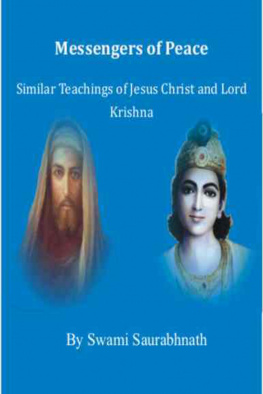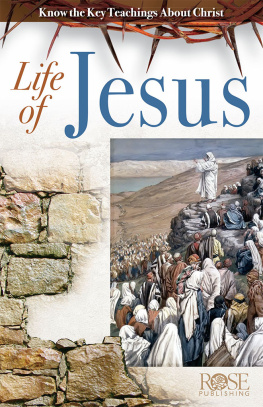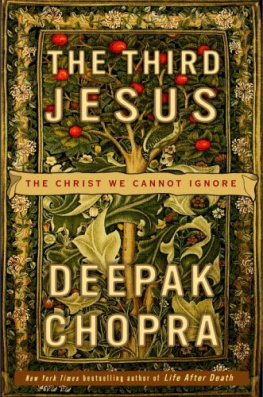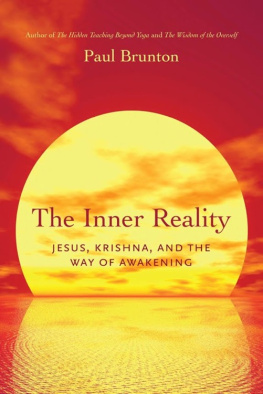Messengers of Peace
Similar Teachings of Jesus Christ and LordKrishna
By Swami Saurabhnath
Copyright 2015, Swami Saurabhnath, all rightsreserved.
Smashwords Edition, License Notes:
Thank you for downloading this free eBook.You are welcome to share it with your friends. This book may bereproduced, copied and distributed for non-commercial purposes,provided the book remains in its complete original form. If youenjoyed this book, please return to Smashwords.com to discoverother works by this author. Thank you for your support.
Table of Contents
Preface
Namaste,
As you can know by my name, I belong to theHindu tradition. But I am also interested in studying thescriptures of other religions and the messages given by theirprophets. One day I was reading the Bible and then suddenly onething shocked me that Jesus was telling people that the kingdom ofGod is within them. I give that quotation of Jesus here, whenPharisees asked Jesus that when the Kingdom of God will come? Jesussays, The Kingdom of God does not become visible. People will notsay that is here or that is there because the Kingdom of God iswithin you. Luke -17.20-21. I realized that this person is clearlystating the mystical truth which we try to learn in our tradition.So I decided to see if I can find any other quotes of Lord Jesuswhich can resemble with the teachings of Hinduism so that I can seemyself clearly and tell people that the basics of teachings ofJesus and the teachings of mystics from east are same. But to showthe resemblance of Jesuss teachings with the oriental teachings, Ineeded an authentic book from Hinduism which I could use toindicate the similarities.
In last year I had completed my book of studyof Srimad Bhagavad Gita and while doing so I had studied Gita invarious ways, so I decided to take help from Gita and Lord Krishnato compare with Jesus. These two great persons of the history, LordJesus and Lord Krishna have shaped the mankind and showed the pathof spirituality to billions of people around the world. When Ilooked at their teachings together, I found striking similarities.In this book I will try to show you those similarities as I understood them (some people may not agree withme). But one thing I want to say that I am not familiar withChristian traditions and customs so in this book I will not mentionanything from Christian rituals or anything from Hindu tradition.Some Christian readers may find this book against their faith but it is not my intention to prove somebody right orwrong , I am just stating my understanding of Jesus Christand Lord Krishna. This book is neither a commentary on Bible nor acommentary on Bhagavad Gita. I will only take quotes of Lord Jesusfrom New Testament of Bible and try to show similar quotes of LordKrishna from Bhagavad Gita. I am using English translation of Bibleso if someone finds any wrong interpretation then I am helplessbecause I have used translation of Bible and not the originalBible. So if there is any mistake in interpretation then thatmistake belongs to the translator and not to me. However, to bemore accurate I have compared three different translations and thencome out with the meaning.
When we look for the common factors of themessage of Jesus Christ and Lord Krishna then we have to rememberone thing that Jesus claimed that He is the son of God and Krishnaannounced that He is the God Himself. It seems that both are notequal but we have to understand that they both are talking from thedifferent viewpoints. Lord Krishna is talking from the Advaita ornon-dual viewpoint and Jesus is talking from the Dvaita or dualviewpoint. To make my point clear that they both were talking aboutthe same thing I have included quotes of Jesus when He talks fromthe Non-dual or Advaita point of view and quote of Krishna when Hetalks from dual point of view.
We usually think that Lord Krishna is not asnon-violent as Lord Jesus is, because Lord Krishna encouragedArjuna to fight with his own brothers and Jesus taught that even ifsomeone strikes you on the right cheek, turn to him the other also.How can we see similarities between these two persons who havecompletely different ideology? To avoid such misunderstanding wehave to understand that Lord Krishna was talking with a warrior inmidst of a war and Jesus Christ was talking with common people andgiving them instructions to live their daily life with peace. Butwhen Jesus Christ went to Jerusalem, He violently drove away thetraders from the temple (Mathew 21.12). He did not show any mercyto them. We can again see that Jesus Christ cursed the religiousleaders (Mathew 23.14-38) for their phony behavior. So we can saythat as Lord Krishna has encouraged Arjuna to fight war for justcause, Jesus Christ was also in favor of fighting againstinjustice. The non-violent teachings of both these great personsare for our daily routine life, but in some exceptional situationswe have to become violent to save good from evil.
One more thing has to be understood that thelanguage used by both prophets are different. We do not find sameinstructions given by Lord Krishna and Lord Jesus, but we can seethe similarity in the underlying message they both give throughdifferent language. So in this book, first I have mentioned theinstructions of anyone of them and then tried to show thesimilarity with the other.
About both, Lord Krishna and Lord Jesus, manymiracles are told. In this book we will not discuss about anymiracle of these two, I will only try to find similarities betweenwhat they both have told us, I will not discuss anything whichother people tell about them. In case of Lord Krishna, the messageis given by Him directly in Bhagavad Gita, but in the case of LordJesus, we can only find what other people told about Him and Histeachings in Bible. The people who told us about Him were Hisdisciples so it is possible that they overstated His miracles butthey cannot exaggerate His teachings, so when they say that Jesussaid so then we can trust them. Same is the case with Lord Krishna,it seems that His devotees overstate His miracles but His messageis clear in Bhagavad Gita. So in this book I will only mention theteachings of Lord Krishna and Lord Jesus without any miracles whichare told about them.
In the teachings of Jesus Christ there isonly one concept that I cannot be agreeing with. That concept isthe teaching of The Judgment Day. We can see that Jesus has Himselfspoken about Judgment day on very few occasions in Bible forexample in Mathew 10.15, Mathew 11.22-24. But I think wemisunderstand His teaching about Judgment day when we take itliterally. I think as Jesus used to teach people through differentstories, the Judgment day is also a story used by Jesus to teachpeople because people around Him were so much interested in it. Toincrease the awareness among people Jesus has used the Judgment dayas a tool. Judgment day is basically not the teaching of JesusChrist but it was already prevailing in the people at the time ofJesus, so I think Jesus accepted it and used it for the good ofpeople.
I am personally not in favor of Judgment daybecause as per my current knowledge it indicates the end of todaysworld and start of a new world. The sinners of todays world wouldbe thrown into hellfire forever and the righteous people willinherit the heaven forever. This I think is not right approachbecause there is no sin which should have punishment for eternityand there is no good act which can be rewarded heaven forever. Thevery idea of collective punishment or reward is not right becausewe all are different individuals and we all have different fate. Insome cases like accidents, wars or disasters there might becollective fate of people who get affected by those incidents butcompared to all living beings such incidents are rare, thecollective fate cannot be the law for all.
In my opinion the world we live will nevercome to an end because even if it ends a new cycle will startsomewhere in the infinite space. Different souls will havedifferent bodies of humans, animals, birds or trees according totheir own desires. The manifestation of souls into different formswill continues for eternity and they will be rewarded or punishedfor particular time according to their merits or demerits, not foreternity.
Next page









